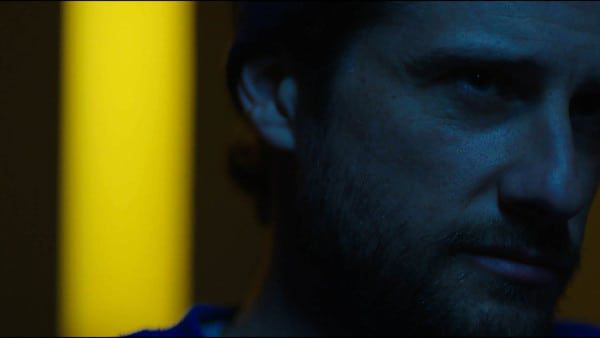Eye For Film >> Movies >> Saul At Night (2019) Film Review
Saul At Night
Reviewed by: Anton Bitel

There is in the background of Cory Santilli's feature debut (written by Daniel Miska) a science-fiction premise explaining why it is that protagonist Saul (Kentucker Audley) keeps a strictly calibrated waking schedule that is different from everyone else's - including that of his wife Kathryn (Stephanie Ellis) and daughter Cleo (Acadia Colan) - but Saul at Night keeps that explanatory frame somewhat vague and abstract in its background, while preferring to focus on the psychological and emotional toll taken by only ever seeing one's loved ones asleep.
For even though Saul inhabits the same house, even the same rooms, as his family, they haunt each other's lives like ghosts, and Saul's loneliness in the long night hours leads him to compensate for his wife and child's absence by staging domestic scenarios in which he shares meals and time with mannequin copies of them.
Even the discovery of fellow nocturnal dweller Amalur (Suzanne Clément) serves only further to highlight both these characters' isolation, given that, for all the time that they are now condemned to spend with each other, they speak different languages (she is Francophone) and are unable to understand each other. Subtitles privilege us to appreciate, even better than they can, how deep the contrast is anyway between them in their differing attitudes and responses to their respective exiles from family, as Saul seeks vainly to maintain a fantasy simulacrum of his home life, while Amalur prefers to turn her back on hers.
You can sense the influence of Charlie Kaufman in the common, broadly existentialist themes of memory, alienation and oblivion, and more specifically in the blue-dyed hair that Cleo shares with Clementine Krczynski (Kate Winslet) from the Kaufman-scripted Eternal Sunshine Of The Spotless Mind (2004) and very particular surnames (Capgras, Cotard) which also occurred in Kaufman's Synecdoche, New York (2008), alluding significantly in both films to psychiatric delusions which are dramatised by the characters' actions and afflictions.
Much as Kaufman's Anomalisa (2015) reduced its characters' all too human flaws and routine drudgeries to stop-motion puppetry, here characters are replaced with dummies and dolls, as the most everyday of activities are turned into performance. Meanwhile Santilli, whose film had its world premiere in Tallinn, finds his own clock-based rhythm, as aching as it is absurd, for these melancholic motifs, making Saul at Night a moving mystery that, in never fully answering the questions that it raises, will continue occupying the rooms of your mind in both waking and sleeping hours.
Reviewed on: 25 Nov 2019














